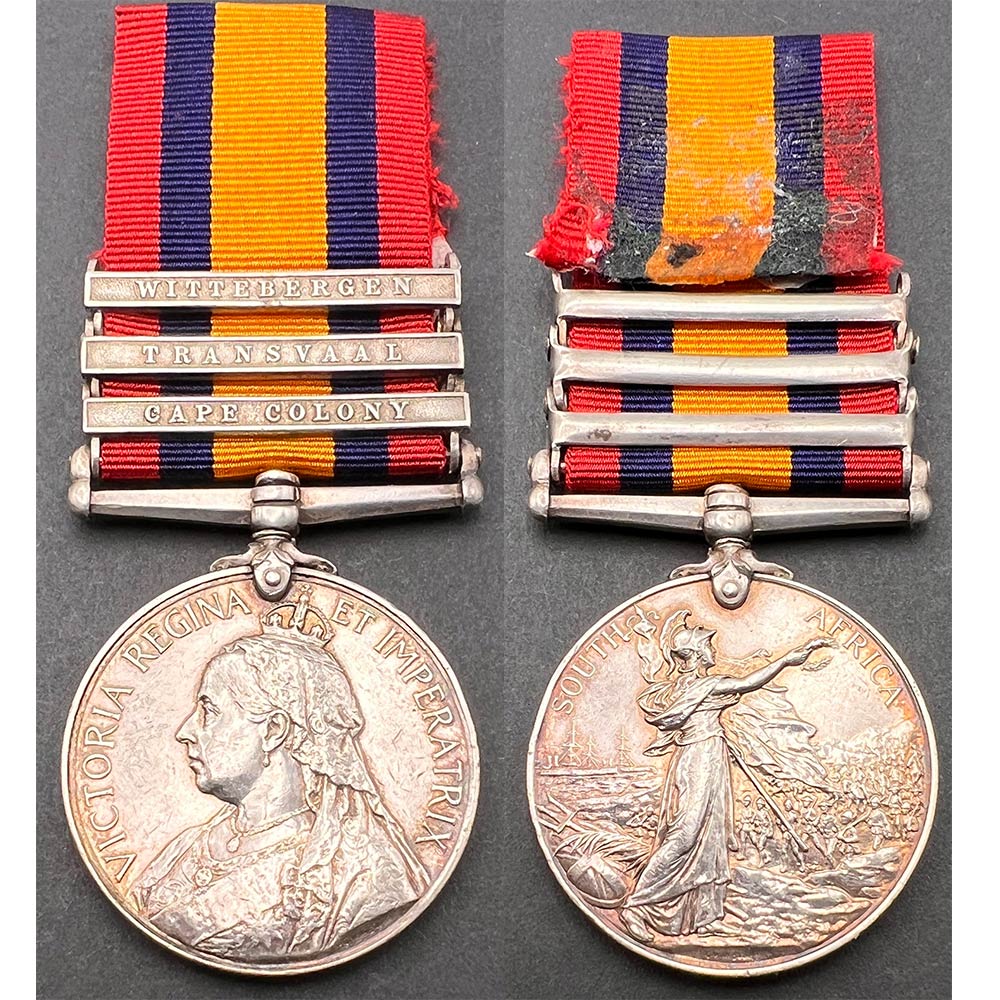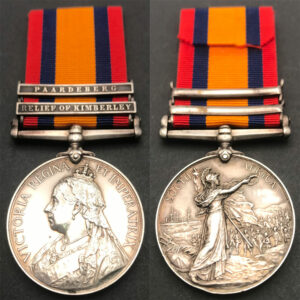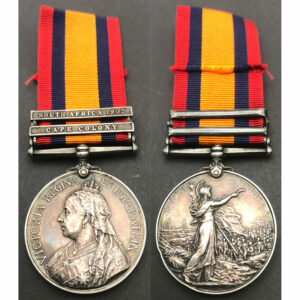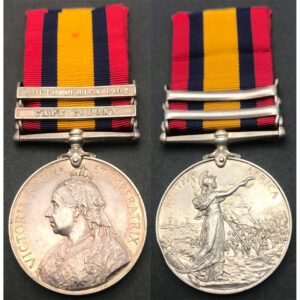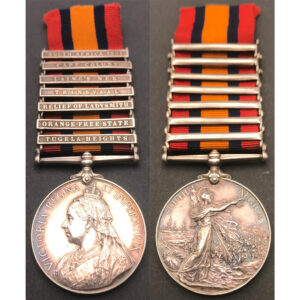Description
Queen’s South Africa, 3 bars, CC, Transv, Witt, 2154 Corporal George Mercer, 2nd Battalion Manchester Regiment.
Officially impressed: “2154 Corpl: J. Mercer Manch. Regt.”
Confirmed on the medal roll. With copy service papers.
Please note the man was named George, but the medal is named to “J”, which is absolutely correct according to the medal rolls. He has a detailed service file, stemming from (according to his records) a letter sent in about a “Pte J. Mercer” to the Army Records office circa 1947. His father’s name was James however.
George Mercer, had first signed up with the Manchesters aged 18 back in 1888, serving as a Bandsman for some years, remobilised he fought in the Boer War with the 2nd Manchesters, until invalided home and discharged.
In late 1914, he tried to fight once more, signing up with the 3rd Bedfordshire, but would be found unlikely to become an efficient soldiers on Christmas Eve 1914 and discharged.
It took him a whole week until he tried again, he signed up with the Middlesex Regiment as soon as the New Year had begun, who accepted him and spent time with the 9th Middlesex Regiment, where he rose from Private, to Lance Corporal, to Corporal in under 2 months.
He would serve out the war in England with the Royal Defence Corps, doing his part even though he would earn no medals for this service until his discharge in 1919.
George Mercer, was born in 1870 in Cranleigh, Guildford, Surrey.
The son of James and Jane Mercer, he had numerous siblings back home in Guildford, Brothers Arthur, William and Harry
At the age of 18, he signed up with the Manchester Regiment, spending most of his as a Bandsman with the Manchester Regiment.
He joined up on 8th march 1888, and was appointed as Bandsman to 1st Battalion on 18th February 1890.
Following his 5 years with the Colours, he joined the Army Reserve on 17th May 1893 to serve out the rest of his period of engagement.
It was on 26th December 1899 that he was “Recalled To The Colours under Special Army Order”.
He was Appointed lance Corporal on 10th February 1900.
He saw service in South Africa until he was invalided and returned home to be discharged.
Officially discharged on 29th April 1901.
Previously whilst on service he had married Annie Jane Austin at St Mulbroses Church in Kinsale, Cork on 19th June 1893.
The following letter was sent by George during late 1902 regarding his medal, having missed out on the delivery:
“I will oblige yours truly G. Mercery, late Corporal of the 2nd Manchester Regiment,
Sir, having received a letter from the War Office stating that you sent my Certificate of Character and Medal to 54 Borthwick Road, Hendon, but had it returned as I was gone away, so will you kindly forward.”
A further letter dated 1947 inquiring into his service from the War Office reads, the letter appears to come from a Medal Collector or family member:
“J. Mercer formerly 2154 Cpl 2nd Bn Manch Regt
I am directed to reply to your letter 1952 L of January 6th 1947, and to inform you that according to official records the above named man was awarded the Queen’s South Africa Medal and clasps Wittebergen, Cape Colony, and Transvaal, while serving on a regular army engagement.
Documents returned herewith, Director of Personal Services, Royal Hospital, Chelsea.”
During World War 1, he returned to service as 7930 George Mercer, 3rd Bedfordshire Regiment.
He was 45 years old having served “1st Manchester Regt Corporal and Bandsman for 13.5 years, termination of engagement”.
He went on to serve at home, from 19th September 1914 until 24th December 1914.
However due to his age and general health he was found to be “Unlikely to become an efficient soldier” and so ended his hopes of being sent to fight the Germans in December 1914.
So he did what anyone older Patriot might do, and tried again, this time he managed to slip by, and make it into the 9th Middlesex Regiment, and further joined the Royal Defence Corps during April 1916, having previously risen from Private up to L/Cpl and then Cpl in only 2 months.
He did not manage to get himself posted overseas, and earned no medals but served the second period from 2nd January 1915 until 10th April 1919, all in England.
It looks like he had spent Christmas considering trying again, and went in right after new years to sign on again, only having a break between Christmas and New Years of 1915.
